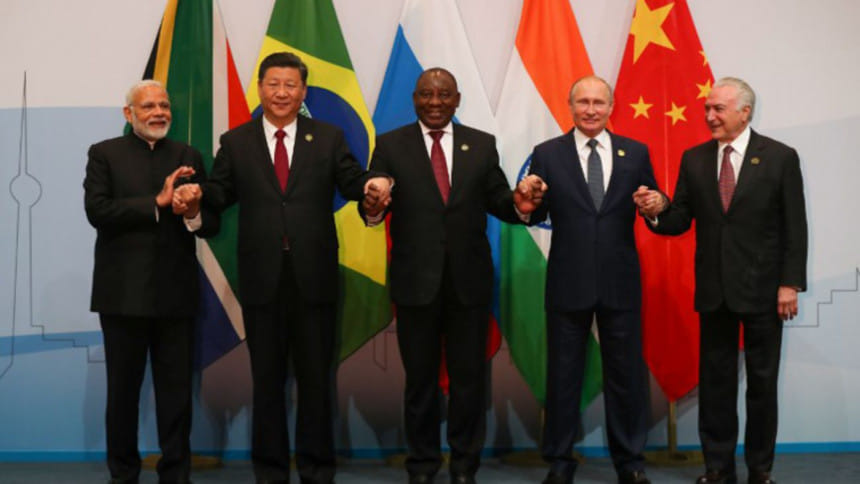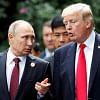Reminding the world of the importance of multilateralism

The 10th BRICS summit (July 25-27, 2018) has just concluded in Johannesburg, South Africa. South African President Cyril Ramaphosa hosted China's President Xi Jinping, Russian President Vladimir Putin, Indian Prime Minister Narendra Modi and Brazilian President Michel Temer. Eighteen African leaders, along with leaders from Turkey, Argentina and Jamaica, were also invited as guests. The main theme of the conference was "Collaboration for Inclusive Growth and Shared Prosperity in the 4th Industrial Revolution."
The summit came at a time when global trade war looms large—threatening world trade and commerce. With the summit President Ramaphosa also celebrated the centenary of the birth of Nelson Mandela, acknowledging his contribution to democracy and service to humanity.
The American administration driven by aggressive nationalism has actually threatened imposing high tariffs on imports from China and European allies. These policies of Washington have seriously upset the global economic system that was devised after WWII. There are acrimonious debates among members of the Western alliance that reflect that the West is in serious dysfunction—both on global economic issues and with security matters. The recent G7 Summit in Quebec, Canada (June 8-9) and the NATO summit in Brussels (July 11-12) speaks loudly that the Western alliance is arguably in decline.
China, the second largest economy in the world, is actually the driving force behind BRICS. Xi Jinping, emphasising the importance of globalisation called upon member countries to resist the growing global trade war by working together to build an open world economy. Xi said trade wars should be rejected "because there will be no winner". Understandably global trade issues dominated the conference.
The 102-paragraph Final Declaration issued after the concluding session amply reflects the worries and anxieties of the five leaders. The declaration divided into four broad segments dealt with strengthening multilateralism, enhancing globalisation, reinforcing international peace and security, and strengthening international cooperation.
On strengthening multilateralism the summit raised several issues calling for greater cohesion in global-governance, i.e. stronger role of the United Nations in conflict resolution and representation in other world organisations. It raised the issues of the Syrian conflict, Afghan civil war, Palestinian-Israeli conflict, climate change, terrorism, etc. where the United Nations should play a strong role in establishing peace and ensuring security. With regard denuclearisation of the Korean peninsula the Declaration called for a peaceful diplomatic solution. As for JCPOA, the BRICS leaders emphatically called on all parties to fully comply with the obligations of the agreement.
On global economic growth the leaders expressed concerns as the global trading system is facing serious challenges. The statement read, "We recognise that the multilateral trading system is facing unprecedented challenges. We underscore the importance of an open world economy." It called for strengthening the WTO mechanism to resolve trade disputes. The leaders welcomed the successful test-run of the BRICS Contingent Reserve Arrangement (CRA) and asked for closer cooperation between the IMF and CRA. The leaders also noted the role played by the New Development Bank in catalysing private sector financing of private sector infrastructure and investment.
Interestingly while the summit demonstrated apparent signs of unity against the US-led challenges to the global economy, the two largest members—China and India—were actually vying for influence over the African continent. Before attending the summit, Xi Jinping made a quick tour of Senegal and Rwanda. Evidently Xi was drumming up support for his Belt and Road Initiative. Not to stay behind, Narendra Modi also visited Rwanda and Uganda before arriving at Johannesburg. Despite the informal summit bonhomie at Wuhan in late April—China and India remain rivals. But the fact remains that both China and India the two most populous nations and rapidly growing economies of BRICS—need to cement their energies to confront global challenges as their interests are convergent, at least on economic issues.
China is petrified that a trade war with US will cripple its growing economy, which is based on exporting to the consumer markets around the world. America constitutes the largest market—almost 20 percent (USD 431 billion, 2017) of Chinese exports went to that market. Xi Jinping needs Modi's support more to face the challenges from America, because the other three members do not have as much clout on the world economy as India.
Russia is not fully integrated with the global economy and certainly at odds with the West. However, after his recent talks with Donald Trump (Helsinki, July 16) Putin has been looking to enhance Russia's political position globally and within BRICS. But with economic sanctions over its head Moscow's ability to manoeuvre is limited.
Brazil's economy has not fully recovered (GDP growth one percent, 2017) from the depression it suffered in 2015 and 2016. Michel Temer's tenuous economy is threatened by various knock-on effects from the American trade and currency war. With a ballooning debt problem, Temer is seeking financial support from the New Development Bank to help Brazil's balance of payments.
And South Africa with a much smaller economy (GDP USD 280 billion, 2017) does not carry any global influence. Ramaphosa welcomed the Belt and Road Initiative as it is likely to bring fresh Chinese investment into his stagnated economy.
BRICS was formed in 2009 at a time when the world economy was going through a serious depression. The idea was to pursue the "other options" and reverse some of the evil trends and revive the global economy. Critics say that despite 10 summits the block which has 41 percent of world population, 23 percent of world GDP worth about USD 40.6 trillion and 18 percent of world trade—its impact and progress on the world stage has been rather slow.
As the world economy is going through profound transition and changes, the BRICS summit has once again reminded the world the importance of multilateralism and globalisation. Actually, unilateralism and trade wars do not increase the world's wealth—it only makes nations and people poorer.
Mahmood Hasan is former Ambassador and Secretary.










Comments